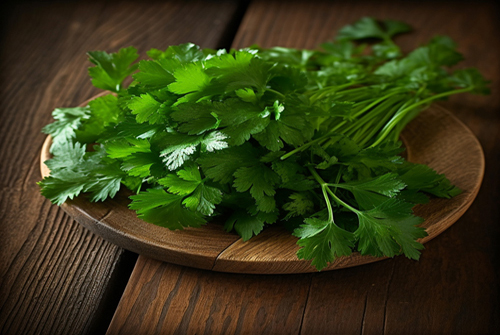Parsley
Posted on Sep 13th 2023

Parsley (Petroselinum crispum) is a commonly used herb in various cuisines around the world. Apart from its culinary uses, it has been recognized for its potential health benefits. However, like all herbs, it should be consumed in moderation to avoid potential side effects. Here's a summary of its uses, benefits, and potential side effects:
Uses
- Culinary Uses:
- Garnish: Used to decorate dishes.
- Ingredient: Used in various recipes including soups, sauces, salads, and meat dishes.
- Flavoring: Fresh or dried parsley can be used to enhance the flavor of many dishes.
- Medicinal Uses: Traditionally, parsley has been used for various ailments, though modern scientific research on some of these uses is limited.
Benefits
- Nutritional Benefits:
- Rich in Vitamins: Especially vitamin K, vitamin C, and vitamin A.
- Minerals: Provides iron, calcium, potassium, and magnesium.
- Fiber: Aids in digestion and promotes gut health.
- Antioxidant Properties: Parsley contains flavonoids and other compounds that act as antioxidants, which help in neutralizing free radicals in the body.
- Supports Kidney Health: Parsley has been traditionally used as a diuretic, which helps increase urine output and potentially helps in flushing out kidney stones.
- Anti-inflammatory Properties: Parsley contains compounds that have anti-inflammatory effects, which might help reduce inflammation in the body.
- Supports Immune Function: The vitamin C content in parsley supports immune function.
- Bone Health: Parsley’s vitamin K content plays a role in bone mineralization, making it beneficial for bone health.
Side Effects
- Oxalate Content: Parsley contains oxalates, which in large amounts might contribute to kidney stone formation, especially in susceptible individuals.
- Allergic Reactions: Some people might be allergic to parsley and can experience skin reactions or more severe allergic responses.
- Drug Interactions: As a natural diuretic, parsley might interact with certain medications, especially diuretics and anticoagulant/antiplatelet drugs.
- Pregnancy Concerns: Excessive consumption of parsley, especially its oil and seeds, might lead to uterine contractions and should be avoided by pregnant women.
- Excessive Vitamin K: While vitamin K is beneficial for blood clotting, very high levels can interfere with certain medications, like warfarin, and potentially increase the risk of clotting too quickly.
- Photosensitivity: In very rare cases, direct skin contact with parsley followed by exposure to sunlight might lead to skin inflammation or photosensitivity in some individuals.
As with any herb or supplement, it's essential to consult with a healthcare provider before making significant changes to one's diet or before using parsley for therapeutic purposes.
 Loading... Please wait...
Loading... Please wait...